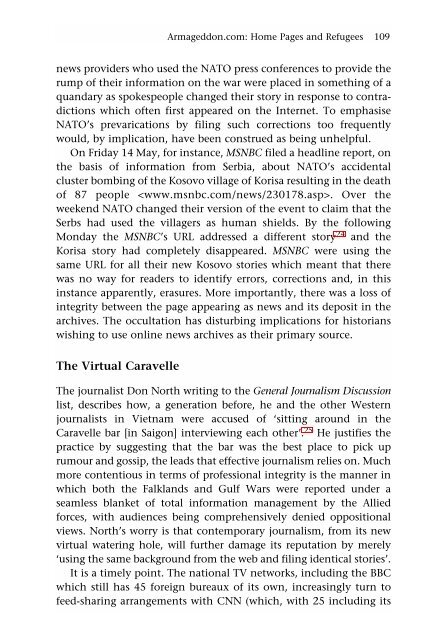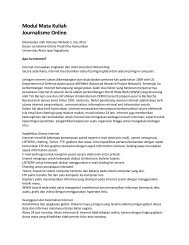Online Journalism - Ayo Menulis FISIP UAJY
Online Journalism - Ayo Menulis FISIP UAJY
Online Journalism - Ayo Menulis FISIP UAJY
You also want an ePaper? Increase the reach of your titles
YUMPU automatically turns print PDFs into web optimized ePapers that Google loves.
news providers who used the NATO press conferences to provide the<br />
rump of their information on the war were placed in something of a<br />
quandary as spokespeople changed their story in response to contradictions<br />
which often first appeared on the Internet. To emphasise<br />
NATO’s prevarications by filing such corrections too frequently<br />
would, by implication, have been construed as being unhelpful.<br />
On Friday 14 May, for instance, MSNBC filed a headline report, on<br />
the basis of information from Serbia, about NATO’s accidental<br />
cluster bombing of the Kosovo village of Korisa resulting in the death<br />
of 87 people . Over the<br />
weekend NATO changed their version of the event to claim that the<br />
Serbs had used the villagers as human shields. By the following<br />
Monday the MSNBC’s URL addressed a different story 24 and the<br />
Korisa story had completely disappeared. MSNBC were using the<br />
same URL for all their new Kosovo stories which meant that there<br />
was no way for readers to identify errors, corrections and, in this<br />
instance apparently, erasures. More importantly, there was a loss of<br />
integrity between the page appearing as news and its deposit in the<br />
archives. The occultation has disturbing implications for historians<br />
wishing to use online news archives as their primary source.<br />
The Virtual Caravelle<br />
Armageddon.com: Home Pages and Refugees 109<br />
The journalist Don North writing to the General <strong>Journalism</strong> Discussion<br />
list, describes how, a generation before, he and the other Western<br />
journalists in Vietnam were accused of ‘sitting around in the<br />
Caravelle bar [in Saigon] interviewing each other’. 25 He justifies the<br />
practice by suggesting that the bar was the best place to pick up<br />
rumour and gossip, the leads that effective journalism relies on. Much<br />
more contentious in terms of professional integrity is the manner in<br />
which both the Falklands and Gulf Wars were reported under a<br />
seamless blanket of total information management by the Allied<br />
forces, with audiences being comprehensively denied oppositional<br />
views. North’s worry is that contemporary journalism, from its new<br />
virtual watering hole, will further damage its reputation by merely<br />
‘using the same background from the web and filing identical stories’.<br />
It is a timely point. The national TV networks, including the BBC<br />
which still has 45 foreign bureaux of its own, increasingly turn to<br />
feed-sharing arrangements with CNN (which, with 25 including its
















